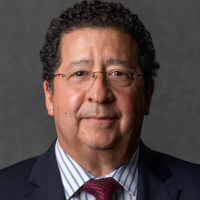Sub-Saharan Africa: Energy Security and Growth
Africa Program and Regional and Global Energy SeriesHost Program on Sub-Saharan Africa: Energy Security and Growth The Wilson Center’s bimonthly Regional and Global Energy Series continued on March 10th, as the Africa Program hosted a panel of experts, many of whom contributed to the book Energy and Security: Strategies for a World in Transition, published by the Wilson Center Press and Johns Hopkins University Press. This event shifted focus away from the projections and implications of the drop in oil prices, to examine 1.) the prospects of transparency and establishing infrastructure changes in African nations to attract investment, and 2.) the regulatory mechanisms that can guard against state corruption. The panelists included: Phillip van Niekerk, Managing Director of Calabar ConsultingMichele Rivard, Chief of Staff of the U.S. African Development FoundationCharles McPherson, international advisor on petroleum, minerals, policies, and taxationDavid L. Goldwyn, President of Goldwyn Global Strategies and former State Department special envoy and international energy coordinator Andrew Selee, Executive Vice President of the Wilson Center, opened the event with a welcome, noting that proven reserves in Africa have doubled over the last 30 years. Next, Jan H. Kalicki, Public Policy Fellow and Energy Lead and co-editor with David Goldwyn of Energy and Security, opened the conversation with a discussion of the book’s energy framework. Kalicki focused on two themes. First, he noted that a national energy policy for the United States still needs to be established, although there has been progress, including The Quadrennial Energy Review of the Obama administration and the new Energy and National Resources Bureau at the State Department. Second, Kalicki highlighted the need to create a global energy security system (GESS) to update the international energy architecture that has seen traditional consumers becoming producers and traditional producers becoming consumers. Phillip van Niekerk then described the hydrocarbon boom in Africa, which has seen its list of producers extend from traditional oil producers like Angola and Nigeria to include new producers like Somalia, Mauritius, and others. The falling price of oil in the last six months has dampened the hydrocarbon boom of 2014, which has limited the possibilities for African nations seeking to become major oil and gas producers. For example, Tullow Oil – a major company that operates in 15 African nations – and other companies have canceled offshore exploration and deep sea drilling, to focus on on-shore projects. Similarly, although there have been rapid advances in liquefied natural gas (LNG), LNG remains linked to the price of oil. Ultimately, van Niekerk recommended that African nations continue to pursue growth by investing in the manufacturing and consumer sectors, rather than relying on revenue from the extractive sector. Providing energy for the 1.4 billion people who are energy insecure globally is one of the six steps of the GESS framework. To this end, Michelle Rivard discussed the U.S. Power Africa Initiative, which aims to provide energy feasibly and affordably to 600 million people in Africa. Power Africa connects African governments with private sector partners, and already nearly 90 partners have committed US$20 billion to the initiative. As one example, Power Africa awarded solar company GVE a US$100,000 grant to light the community of Egbeke in the Niger Delta.Charles McPherson underlined the importance of payment and revenue flow under the Extractive Industry Transparency Initiative, of licensing procedures and awarding contracts openly and transparently, and of effective management of revenue, savings, and expenditures. McPherson differentiated between “output” (e.g. EITI adherence) and “outcomes,” whereby people use concrete steps to question their administration’s actual performance. He cited the examples of Ghana, Liberia, and Mozambique, countries which publish their contracts and thereby reduce the risk of corruption. David Goldwyn asserted that it is difficult yet possible for Africa’s new energy producers to learn from their predecessors’ mistakes, and leverage resource revenues to bring about economic growth and improved living standards for their populations. Producer state governments and other stakeholders face three significant challenges: 1.) the low oil price cycle, which further necessitates that countries offer competitive terms and a stable investment environment to attract increasingly scarce investment dollars; 2.) the proliferation of small- and mid-size companies that have proven capable of making significant discoveries yet often face difficulties making large medium-term investments; and 3.) the provision of requisite “shared value” early in the exploration phase to ensure that producing country citizens benefit from resource development nationwide and producer governments refrain from extracting excessive rent in the future. For governments to better ensure that hydrocarbons development renders tangible benefits, they must build the capacity to carry out licensing, auctions, and procurement early in the exploration phase, prioritize transparency and accountability, and find means to provide shared value. Goldwyn also recommended that the US channel more bilateral assistance to early capacity building, provide support to multilateral capacity building efforts, leverage the Department of Commerce to support shared value initiatives including gas to power and gas to fertilizer projects, apply more commercial diplomacy to recalibrating electricity frameworks to support gas to power investments, and support good governance and transparency efforts worldwide. As Andrew Selee noted in his introduction, Sub-Saharan Africa has tremendous energy opportunities, but the complexities stemming from the decrease in oil prices, from governance and transparency efforts, and from the new face of investors present energy challenges for the continent as well.
Speakers

Hosted By

Africa Program
The Africa Program works to address the most critical issues facing Africa and US-Africa relations, build mutually beneficial US-Africa relations, and enhance knowledge and understanding about Africa in the United States. The Program achieves its mission through in-depth research and analyses, public discussion, working groups, and briefings that bring together policymakers, practitioners, and subject matter experts to analyze and offer practical options for tackling key challenges in Africa and in US-Africa relations. Read more
